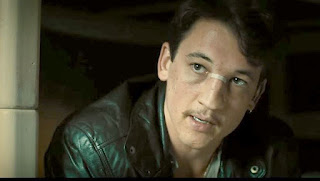Jennifer Lawrence is not only an Oscar-winning actress with a household nickname, she's also one of Hollywood's most in-demand young stars, who seems to have her pick of the best roles while others are left to comb through her leftovers.
Shailene Woodley, for example, had a similar start in the biz and has also enjoyed critical acclaim, but career-wise, Lawrence is unquestionably the girl on fire right now. As producers were assembling the Hunger Games cast, both Lawrence and Woodley had recently drawn critical raves. Lawrence's work in Winter's Bone earned her the first of her four Oscar nominations, and Woodley's part in The Descendants gained her a Golden Globe nom. While Woodley's box office record is nothing to shake a stick at ($1.25 billion worldwide), Lawrence's commercial clout is even more impressive: $5.273 billion worldwide, earning an average of $139 million in domestic sales.
Woodley's The Fault In Our Stars did very well too, but some of her other films (like The Spectacular Now and White Bird in a Blizzard) were DOA, money-wise. As her career shifts into post-YA franchise mode, Woodley has been somewhat pigeonholed—a marked contrast to Lawrence, who's comparatively free to spread her wings in a variety of genres. Woodley will star in the true story-based film Snowden, featuring the same serious, seldom-smiling persona that has become synonymous with her roles.
Meanwhile, you'll soon see Lawrence keeping her fans on their toes with a new sci-fi adventure (Passengers, which hits theaters on Dec. 21, 2016), a wartime biopic (Steven Spielberg's It's What I Do), and a thriller (Darren Aronofsky's as-yet-unnamed project). Woodley probably has the capacity to do more, but hasn't had enough opportunities to prove it yet.
Headlines sell tickets, and being the subject of a mass photo-hacking incident, or breaking up with her latest boyfriend, it seems like just about anything Lawrence does makes national news. Lawrence has a gift for gab, and she knows how and when to use it. Her constant self-deprecation and quick wit with the media make her relatable and easy to root for.
Meanwhile, Woodley's private life is… well, private, which means people may feel less invested in her "personal brand"—and, ultimately, her career. Even when she did have a haircut heard 'round the world moment, it was for a film, and although she's active on social media, it's largely for political discourse that lifts none of her personal veil.
Woodley's rather reserved demeanor during interviews gives audiences little to chew on during her public appearances and certainly doesn't leave the kind of lasting impression that tends to drive people to theaters. Lawrence is also the face of Dior, whose clothing she frequently dons on the red carpet and accessories she models in print ads. Woodley, on the other hand, has no such fashion house endorsement and is thus not plastered all over billboards and magazine pages. She's dabbled in a bit of charity work and environmental advocacy, but she's yet to become the face of any particular organization—she did speak at a Bernie Sanders rally during the 2016 presidential campaign. Source: www.nickiswift.com
In Passengers, they play a writer (Jennifer Lawrence) and a mechanic (Chris Pratt) who wake up early during 120-year trip to another planet. "It was just nerve-racking," Lawrence told E! News in May of the sex scene. "It's not even about your co-star because Pratt is so wonderful and lovely. My nerves weren't about him." She said the anxiety stemmed from being watched by "everyone you work with--all of the cameramen, all the producers and the director." Source: www.eonline.com
"It's my favorite scene in The Spectacular Now. It sounds so funny to say that. It really is," Woodley enthused. "I can't think of one single love-making scene in any film that I've ever been, 'Yeah, that's real,' or 'That could actually happen that way.' That scene was a nice way for both of us to lose our on-screen virginities because it was a really safe environment, and we felt very cared for. And everybody was really compassionate towards our needs and not making it feel exposed or exploited in any way." Of course, it helped that Woodley felt totally comfortable thanks to Miles Teller.
"I think we help each other though," Woodley said of Teller. "He helps me, I think, have more fun when I get caught up in being serious. And I think I help ground himself in a way that's perhaps more natural than his other choices." Source: www.mtv.com
Esquire: -What about the sex scene?
Miles Teller: -For prep, it was going to be my first sex scene in this movie, and I thought I'd buff out, and Shailene said no I don't think so, have a little belly. So for a couple months, I didn't go to the gym and drank a little more. It was awesome until I finished The Spectacular Now and had three weeks to prepare for Two Night Stand and knew I was taking my shirt off again, so I had to workout really hard. There's a little bit of leftover Sutter in him. I enjoy making comedies but dramas come more naturally. Source: www.esquire.com































































